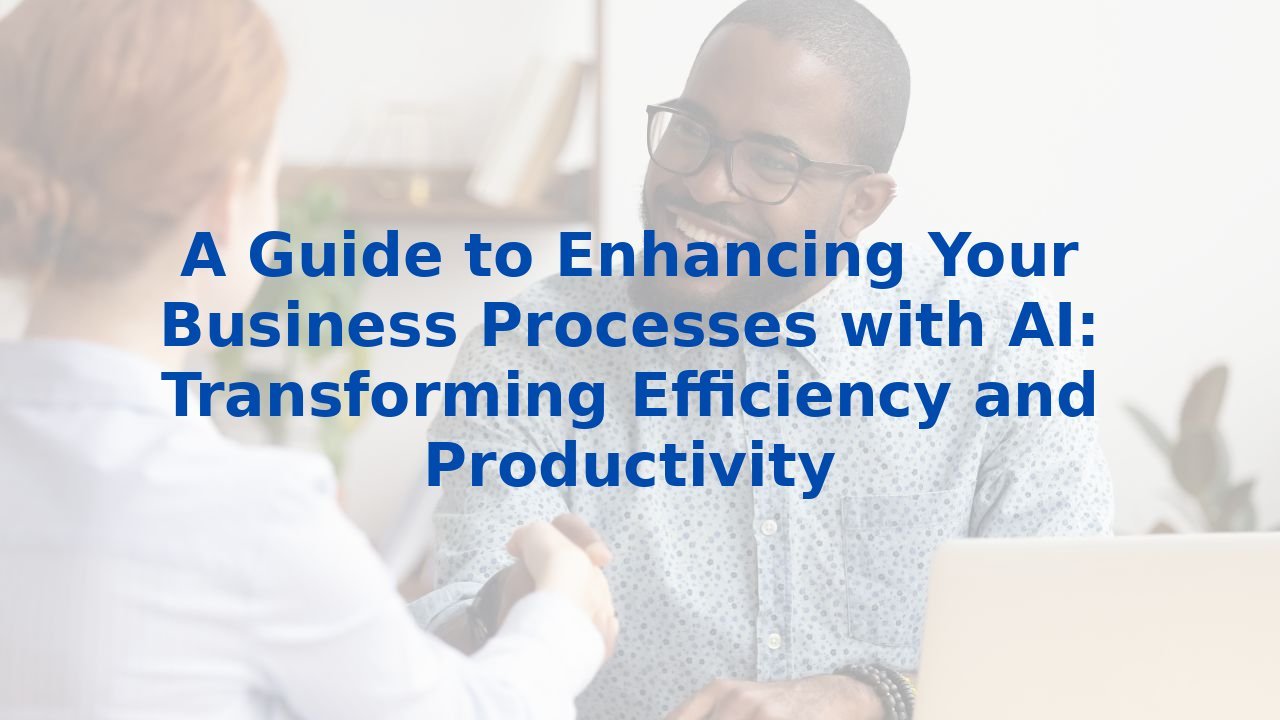A Guide to Enhancing Your Business Processes with AI: Transforming Efficiency and Productivity
A Guide to Enhancing Your Business Processes with AI: Transforming Efficiency and Productivity
In an era defined by rapid change and relentless competition, organizations are on a continuous quest for solutions that drive efficiency and elevate productivity. Enter Artificial Intelligence (AI)—a transformative force that hasn’t just arrived, it is reshaping business landscapes. With its ability to automate tasks, enrich decision-making, and optimize operations, AI is the key to unlocking a new level of effectiveness in various business processes. This guide explores the different business processes AI can enhance and the benefits of integrating AI into your organization.
1. Automating Routine Tasks
Imagine a world where mundane tasks are left to machines. AI excels in automating routine tasks, making this a tangible reality. Consider the typical demands of a busy meeting: scheduling appointments, capturing crucial highlights, and generating actionable notes. With AI, these tasks can be automated. For instance, voice assistants can seamlessly coordinate meetings, while AI-driven tools can summarize conversations and highlight key points for follow-up.
Sales teams, too, can reap the rewards of AI automation. Data entry, report generation, and even drafting communication can be executed effortlessly through intelligent systems. Predictive analytics not only identify which customers are likely to generate more revenue but also help prioritize sales efforts, allowing teams to invest their time wisely. This increased efficiency not only reduces administrative burdens but also amplifies the time available for strategic activities.
2. Improving Decision Making
Data-driven decision-making is the bedrock of success in today’s complex business environments. AI enhances this process by sifting through vast data sets to reveal patterns and provide predictive recommendations. For example, AI can analyze customer behaviors to forecast sales trends, enabling businesses to set optimal pricing strategies and allocate resources effectively.
AI also comes into play within Human Resources, where it consolidates various data points—performance metrics, market trends, and budgetary constraints—to guide hiring decisions and salary negotiations. The consequence? Decisions that are not only informed but also fair and competitive.
3. Enhancing Customer Service
Customer service—often the face of any business—benefits immensely from AI integration. Through AI, businesses can offer immediate support while automating mundane inquiries. Chatbots can interact with customers 24/7, handling basic requests and escalating complex issues to human agents when necessary. AI-driven analytics examine customer feedback, identifying actionable insights to enhance service delivery continually.
4. Optimizing Product Development
When it comes to product development, innovation is key. AI’s generative design technology allows designers to input specific goals and requirements, after which the software generates multiple design options. This streamlines the creative process, minimizing the resources needed for prototyping, and accelerates time to market.
5. Streamlining HR Processes
AI’s impact on Human Resources cannot be overstated. By automating initial candidate assessments, AI reduces the time-consuming nature of manual recruitment. Recruitment platforms leverage advanced data analysis to shortlist qualified candidates, aiding hiring managers in making timely decisions while retaining objectivity.
6. Enhancing Sales Processes
Sales processes are evolving thanks to AI’s capabilities. By automating administrative tasks and personalizing the sales journey, AI enhances the customer experience. From recommending sales channels to identifying upselling opportunities, AI informs every step of the sales process. Chatbots can provide potential customers with information, ensuring they receive timely responses that guide their purchasing decisions.
Benefits of AI for Business Processes
The benefits of integrating AI into organizational processes are manifold:
- Improved Efficiency: Automation of routine tasks minimizes manual labor while reducing errors.
- Enhanced Decision Making: AI provides predictive insights, empowering businesses to make informed choices.
- Increased Productivity: By alleviating administrative burdens, AI frees human capital to focus on high-value tasks.
- Better Customer Service: AI personalizes responses, enhances customer engagement, and identifies areas for service improvement.
- Optimized Product Development: Leveraging generative design accelerates and streamlines product creation.
The Role of Employee Training in AI Integration
While the capabilities of AI are groundbreaking, their full potential shines only when employees are equipped to leverage these technologies effectively. A comprehensive training program should focus on:
- Understanding AI Tools: Familiarity with AI systems is critical for effective adoption.
- Data Analysis: Training should empower employees to analyze data through AI tools for informed decision-making.
- Process Optimization: Teams should learn to refine existing processes utilizing AI-driven insights.
- Continuous Learning: A culture of learning is essential as AI technologies evolve.
As organizations embrace AI across business processes and invest in employee training, they set the stage for enhanced efficiency, productivity, and a sustainable competitive edge. In this ever-evolving landscape, the ability to adapt and leverage AI technologies will be a defining factor in long-term success.
Conclusion
In summary, AI is not just a buzzword; it is a transformative tool reshaping business operations across the board. By automating routine tasks, enhancing decision-making, and streamlining customer interactions, AI empowers organizations to enhance efficiency and productivity systematically. Yet, the key to unlocking AI’s benefits lies not solely in the technology itself, but in equipping employees with the skills to harness its full potential, paving the path to a successful, AI-driven future.



